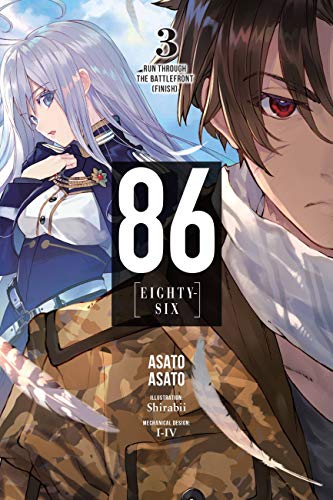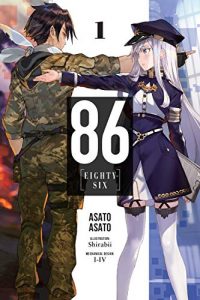By Asato Asato and Shirabii. Released in Japan by Dengeki Bunko. Released in North America by Yen On. Translated by Roman Lempert.
During the course of reading 86, we’ve been following soldiers who are very, very good at their job. Sometimes that job is simply not dying, but that doesn’t matter. They get the job done, they know what to do, they follow orders, but they also think about what’s behind them. They’re good folks. But of course we’re in the middle of total war right now, and the entire Federation cannot be made up entirely of really fantastic elite soldiers. Someone else has to fill out the ranks, to be bodies or ticks on a ledger. Someone who may not have the right schooling or tactical training, but can drive a truck or count supplies. They’re also very frustrated with the war, and increasingly upset with those in charge of it, especially after the hideous events of the last book. All this plus a company made up entirely of a low-level noble and those who follow her unquestioningly, and what do you have? A nightmare is what you have.
The repercussions of last book’s disaster are still being felt throughout the Federation. Everyone is feeling guilty and on edge. Lene is so burned out that she’s sent on enforced leave, and sits this entire book out. But there’s still work to be done. Years ago dams were built to change the course of a massive river, but the war has gone on, the habitats that were in the basin created by the dams are wiped out, and the best way to impede the legion now is to blow up the damn and reverse the effect. That’s what the Strike Package is here to do, and it should be quick and easy, since the Legion don’t know they’re there. Sadly, a rogue regiment called the Hail Mary have decided enough is enough, they’re going to win this war their own way, by stealing some leftover radioactive material left at a nuclear power plant and using it to make a bomb. Um. Yeah.
The books continue to examine prejudice very well, trying to show that it’s not simply a matter of “all the bad guys do it, all the good guys do not”. The Federation is supposedly all about freedom, but freedom also comes with responsibility for having that freedom, and that can be a very hard idea to get across. The people rescued from the Republic have not magically become good and kind after being rescued, and in fact are actively making things worse and using abused children to spy on enemy movements. And the soldiers formerly in the Republic who are now in the Federation army, like Lene, Annette, and others, are faced with resentment and anger, which simmers in the background of this whole book. On the bright side, once the Hail Mary Regiment are brutally dealt with, the actual dam mission goes swimmingly, and they defeat the Legion easily, giving everyone a big mood pickup. Maybe this isn’t a spiraling failure after all.
This series is now basically once a year, so we’ll wait a while for the next book. Till then: war is hell.











